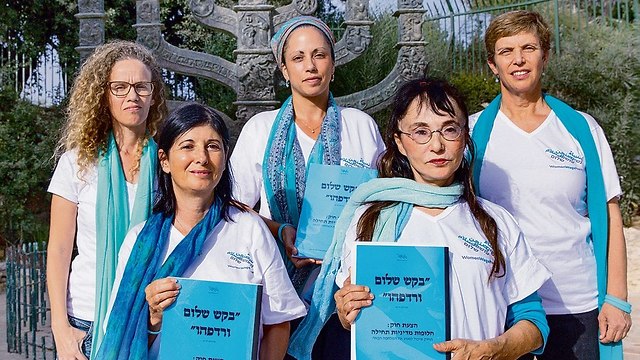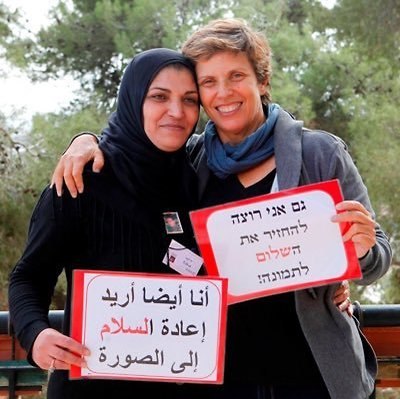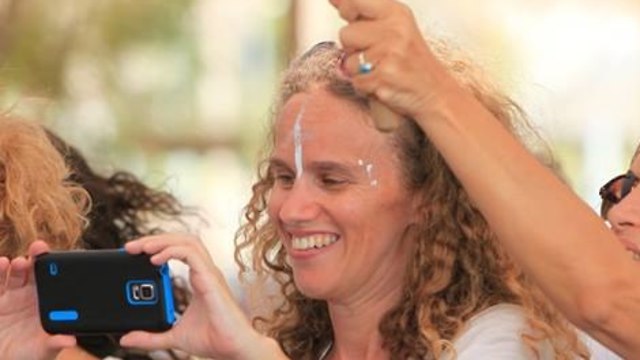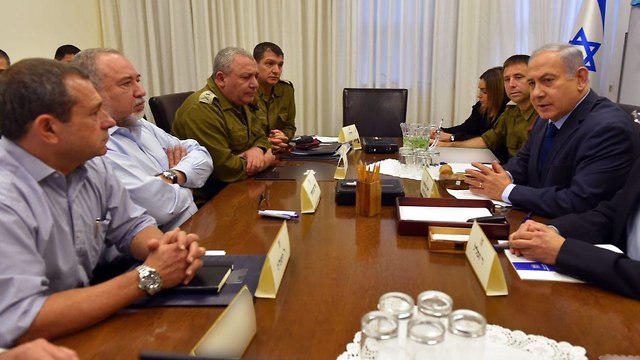

Women on a mission to change Israel's decision-making process
A leftist activist, an actress, a settler, a bereaved sister and the mother of a combat soldier are promoting a bill that requires Security Cabinet members to examine all political options, including diplomatic ones, before going to war; 'The state should leave no stone unturned in making sure we only go on defensive wars.'
A Security Cabinet meeting, the prime minister and his ministers have been sitting in this room for hours, having a long and exhausting discussion about a recent security incident. Around the table are only men… well, mostly men. Only one woman is allowed to enter the room—Justice Minister Ayelet Shaked.
At exactly the same time, five mothers gather around their own table, in their own private Security Cabinet meeting—the Cabinet for War Alternatives. Their goal is to initiate and promote the "Political Alternatives First" bill, which they say can prevent the next war.
The five of them are all active in the Women Wage Peace movement. They come from all political stripes—the Right, the Left, and the Center. This group of women is convinced that to reach an agreement with our neighbors, we must first reached an internal agreement.

"The moral ground behind this bill is the unwritten contract between the state and its citizens. We, and our children, will fight on the front lines and on the home front when they call us. But the government should leave no stone unturned in making sure we only go on defensive wars," says attorney Tami Yakira, 40, a mother of two from Tel Aviv, one of the bill's initiators.
"Over the years, this contract has been violated by Israeli governments—from the 1973 Yom Kippur War to the 2006 Second Lebanon War and the 2014 Operation Protective Edge."
"The idea behind the bill is to build a mechanism that will improve the decision-making process in a three-pronged process. First, the Security Cabinet will routinely discuss the advantages and disadvantages of various policy alternatives," Yakira explains.
"The emphasis here is on routine, because it is clear that in times of emergency—when rockets light up the sky—there is not enough time to examine things at length. If, during routine discussions, Security Cabinet members address relevant solutions to the Israeli-Palestinian conflict, then during emergencies, there will be an a wide range of solutions from which elected officials can choose, according to their worldview," she goes on to say.
"Second, resources will be allocated not only for the next war, but also for the next peace process. One of our friends, whose son is a pilot, says that just as there is a radar that can detect threats in the sky, we should have a radar that can scan various opportunities and solutions that don't include the use of force. The bill instructs the appointment of a deputy national security advisor on diploamtic matters, to strengthen the National Security Council's civilian-diplomatic responsibilities. The deputy will be in charge of finding and initiating alternative policies before presenting it to the Cabinet," she continues.
"We want the discussions to be all-encompassing and to include civilian representatives, research institutes and women. In the spirit of the United Nations Security Council Resolution 1325, we demand female representation in peace processes and politics. Diversity is important in order to prevent a decision-making process based on conformity that may lead to an irrational or dysfunctional decision," Yakira emphasizes.
Sounds nice in theory, but how would this be enforced?
"This is the third part of the bil proposal, which is intended to ensure that words will not remain on paper. How do we enforce it? By imposing a reporting duty both to the Knesset's Foreign Affairs and Defense Committee and to the public, which will only be exposed to unclassified reports. This will allow us, as concerned and hard-working citizens, to ensure that things really happen. If they don't, then we need to develop a public debate or even appeal to the High Court of Justice."
The bill has already been drafted and now its promoters are collecting signatures from MKs and trying to assemble a broad coalition with various politicians from across the political map. They already met with about 20 ministers, deputy ministers and MKs from the Likud, Shas, Zionist Union, Meretz, and the Joint List parties. So far, they have garnered great support, and the bill has already been submitted to the Knesset.
The Women Wage Peace movement was established about four years ago, following Operation Protective Edge. Today the movement has about 40,000 members from all walks of Israeli society: Jewish and Arab, secular and religious, right-wing and left-wing. The movement's declared goal is to promote a political agreement with the Palestinians. Its members are going around the country, listening to various opinions, and holding marches and rallies to promote their cause. They are already well-known in the Knesset.
"When the State Comptroller's report about Operation Protective Edge came out, it felt like we were punched in the gut. The report clearly states that political alternatives to war were not even discussed. The operation could have been prevented," says Yael Admi, a software engineer with a PhD in Philosophy.
"It was hard for me to see the bereaved families' pain during a discussion on the report. For 80 days, we stood in front of the Defense Ministry to promote political alternatives. It did not have much effect, but it did generate a public debate," she adds.
"At one rally, I spotted an ultra-Orthodox man and started talking to him. 'Don't you think the government is already looking for political alternatives?' he asked. The man was a plumber so I asked him if he was ever asked by a client to check the plumbing system and form a maintenance plan for the next 50 years. He admitted that it only happens when a pipeline explodes," Admi continues.
"This is how we conduct ourselves as a state, whether the government is right wing or left wing. After 70 years, it is about time we formulate a mechanism of diplomatic planning and thinking. This, of course, is particularly relevant when you consider what is happening at the Cabinet these days," Admi explains.
A mother's strength is infinite
"Women Wage Peace is different to any other peace movement since it has real diversity. Actress Hava Ortman and I, for example, have very different opinions, but we are both members of Women Wage Peace because we want the conflict to end," says Liora Hadar, 42, an art therapist and parents' instructor from the Alei Zahav settlement.
"In this sense, the Political Alternatives First bill fits the spirit of the movement. All of us, Right or Left, want to find a nonviolent solution to the ongoing conflict. There is not one Knesset member who is supposed to oppose the bill. Its concern is the decision-making method, not the nature of the solution—that will be decided by the leaders," she goes on to explain.
To formulate the bill, the women conducted an in-depth study that included talks with 45 experts from every relevant field, including those involved in decision-making, such as the former heads of the National Security Council.
"We got their full support. They told us that we're addressing the root cause. Everyone is trying to find a solution to the Israeli-Palestinian conflict, but the way in which decisions are made does not leave room for a serious discussion about possible solutions," Admi says.

"For the past nine months, we have been working on this bill, and its feels like giving birth. This has been a healing process for me," Yakira says. "During Operation Protective Edge, I was desolate. Sirens were sounded in Tel Aviv, and I couldn't be near my children. It was intolerable. My partner and I started thinking about moving. Eventually we realized we can't leave Israel, and I promised myself I would do everything in my power to make a difference."
"As a Zionist who immigrated to Israel from France and as a responsible citizen, I tried to help our soldiers during the war as much as I could. But after the war, we had to face the facts. The war lasted 50 days, and no one even considered diplomatic alternatives. Perhaps the Cabinet would have still concluded that there was no choice but to launch a military operation, but we would never know," says Dr. Marie Lyne Smadja, 57, an education lecturer and mother of two.
"We, as humans, have a duty to act intelligently. The Women Wage Peace movement was established so we can start taking responsibility for the situation. Do we want to let terrorists decide our fate for us? I don't. I want to be in a proactive place," she proclaims.
Do you support talking directly to Hamas?
"I don't want to pull an answer out of thin air, but if it is already happening indirectly, I certainly have to consider it," Hadar says. "Today I am much more open to different ideas. Getting to know different women changed me. I live in Judea and Samaria, and I believe it is as much a part of Israel as Haifa or Tel Aviv. Nevertheless, I can understand other political positions. I see the Palestinians who live on the other side of the road. The idea is to open my mind and my heart, and it is mutual."
"Peace is not a one-man show; we can't have only one voice on the stage," says actress Hava Ortman. "There were many peace movements that spoke in a single voice and failed."
What if we learn no one on the other side is willing to make a deal, leaving Israel with no choice but to go to war in Gaza and overthrow Hamas?
"We will be there, we will fight because it is our civil duty, but we want to make sure first that the government has done everything it can. My brother was killed in the War of Attrition, I was 12 years old. I promised my parents I would do everything to promote peace. My mother died grief-stricken. She wrote a book of poems for her dead son. For me, it's like a book of Psalms. I always carry it with me. That's what gives me strength," Admi says.
"A mother's strength is infinite. It comes from the womb. Sometimes I find it difficult to visit the places I grew up in, since it is there that hopelessness resides. The dream is to raise children who will be able to fill their young minds with hopes and dreams, and not worry about their future army service. The Political Alternatives First bill is our way of paving a different path for our children, it is our duty as concerned citizens and mothers, and as a state," she concludes.



















